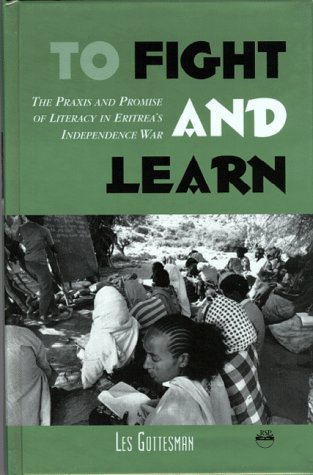To Fight and Learn: The Praxis and Promise of Literacy in Eritrea's Independence War - Hardcover

The Eritrean independence struggle became synonymous with "self-reliance"- a 30-year war fought from wholly within the country by a politically mobilized population supporting a large, well-trained army using captured weapons. The historical and political necessity of Eritrean self-reliance forced Eritreans to plan and test-while fighting for-the kind of society they wanted.
The Eritrean People's Liberation Front, or EPLF, the leadership of the independence war and subsequently the core of the provisional Government of Eritrea (from May 1991) and now (since May 1993) of the Government of Eritrea, has had long-standing plans for the redesign of education to meet the country's needs in the era of peace and political independence. In her 1990 film, ERITREA, Susan Kalish observed:
Envisioning a world beyond war, Eritreans give highest priority to education. Children are enrolled in schools inside liberated Eritrea and in neighboring Sudan. Classrooms are camouflaged to avoid detection by Ethiopian bombers. In the upper grades, classes are taught in English. Fluency in English will keep Eritreans current with worldwide developments in science and technology. English will also help an independent Eritrea community. Adult education is also a high priority. In literacy classes, peasants and fighters alike are being retrained and prepared for independence and self-determination.
Also in 1990, Roy Paterman cited as one of his reasons for "predicting the ultimate success" of the EPLF the close relationship between Eritrean peasants and the movement: "Peasants," explained Paterman, "have been as important as technology in transforming societies," However, "peasants are most likely to revolt if faced with a new or sudden imposition which by the Ethiopian regime, of "land reform" and collective farming, swung peasant support decisively to the EPLF in the 1970s. Since then, the EPLF has managed to introduce many reforms, including land redistribution . "Peasant acceptance of the EPLF's land reform policy has been a major reason for the EPLF's continued ability to mobilize popular support," Pateman concluded. The EPLF, Richard Leonard observed in 1988, has not only been doing things in a very sensible manner, but doing first things first. Since Eritrea is a peasant society, growth and development must begin with the peasantry. The EPLF has recognised this, and in terms of actions undertaken and results obtained, attention is cent [e] red on the peasantry. First things first means beginning with the creation of local democratic organs of self-government. It means involving peasants in such a way that it is they who are the fundamental actors in developing rural society.
"synopsis" may belong to another edition of this title.
"About this title" may belong to another edition of this title.
- PublisherRed Sea Pr
- Publication date1997
- ISBN 10 1569020671
- ISBN 13 9781569020678
- BindingHardcover
- Number of pages280
(No Available Copies)
Search Books: Create a WantIf you know the book but cannot find it on AbeBooks, we can automatically search for it on your behalf as new inventory is added. If it is added to AbeBooks by one of our member booksellers, we will notify you!
Create a Want
